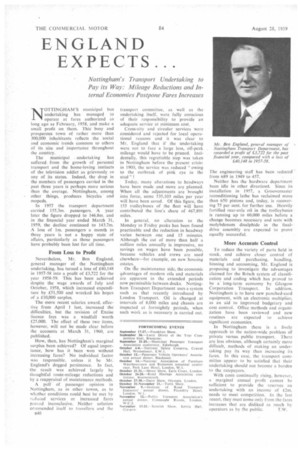ENGLAND EXPECTS...
Page 74

If you've noticed an error in this article please click here to report it so we can fix it.
Nottingham's Transport Undertaking to Pay its Way: Mileage Reductions and Internal Economies Postpone Fares Increases
NOTTINGHAM'S municipal bus undertaking has managed to operate at fares authorized as long ago as February, 1958, and make a small profit on them. This busy and prosperous town of rather more than 300,000 inhabitants reflects the social and economic trends common to others of its size and importance throughout the country.
The municipal undertaking has suffered from the growth of personal transport and the home-loving instincts of the television addict as grievously as any of its status. Indeed, the drop in the numbers of passengers carried in the past three years is perhaps more serious than the average. Nottingham, among other things, produces bicycles and mopeds.
In 1957 the transport department carried 155.3m. passengers. A year later the figure dropped to 146.8m. and in the financial year ended March 31, 1959, the decline continued to 143.7m. A loss of 1m. passengers a month in three years is not a happy state of affairs, particularly as those passengers have probably been lost for all time.
From Loss to Profit
Nevertheless, Mr. Ben England, general manager of the Nottingham undertaking, has turned a loss of £40,148 in 1957-58 into a profit of £3,722 for the year 1958-59. This has been achieved despite the wage awards of July and October, 1958, which increased expenditure by £51,500 and wrecked his hopes of a £10,000 surplus.
The more recent salaries award, effective from April 1 last, increased the difficulties, but the revision of Excise licence fees was a windfall worth £25,000. The effect of these two items, however, will not be made clear before the accounts at March 31, 1960, are published.
How, then, has Nottingham's marginal surplus been achieved? Of equal importance, how has it been won without increasing fares? No individual factor was responsible, unless it be Mr. England's dogged persistence. In fact, the result was achieved largely by thoughtful route-mileage reductions and by a reappraisal of maintenance methods.
A poll of passenger opinion in Nottingham, as in other towns, as to whether conditions could best be met by reduced services or increased fares proved inconclusive. Neither solution commended itself to travellers and the B40 transport committee, as well as the undertaking itself, were fully conscious of their responsibility to provide an adequate service at minimum cost.
Cross-city and circular services were considered and rejected for local operational reasons and it was clear to Mr. England that if the undertaking were not to face a large loss, off-peak mileage would have to be pruned. Incidentally, this regrettable step was taken in Nottingham before the present crisis: in 1900, the service was reduced "owing to the outbreak of pink eye in the stud " !
Today, many alterations to headways have been made and more are planned. When all the adjustments are brought into force, some 535,103 miles per year will have been saved. Of this figure, the 155 trolleybuses of the fleet will have contributed the lion's share of 467,891 miles.
In general, no alteration to the Monday to Friday peaks has been found practicable and the reduction in headway varies between one and 15 minutes. Although the cut of more than half a million miles annually is impressive, no savings on wages have been possible, because vehicles and crews are used elsewhere—for example, on new housing estates.
On tile maintenance side, the economic idvantages of modern oils and materials are apparent in the extended periods now permissible between docks. Nottingham Transport Department uses a system such as that recently introduced by London Transport. Oil is changed at intervals of 8,000 miles and chassis are inspected at fortnightly periods, when such work as is necessary is carried out.
The engineering staff has been reduced from 689 in 1949 to 457.
Neither has the hardware department been idle in other directiong. Since its installation in 1957, a Groovemaster reconditioning lathe has reclaimed more than 650 pistons and, today, is recovering 75 per cent, for further use. Heavily fortified rear-axle oil in the trolleybuses is running up to 60.000 miles before a change becomes necessary and tests with molybdenum disulphide in the finaldrive assembly are expected to prove equally successful.
More Accurate Control
To reduce the variety of parts held in stock, and achieve closer control of materials and purchasing, handling, binning and accounting, Mr. England is proposing to investigate the advantages claimed for the Brisch system of classification and coding which has proved to be a long-term economy by Glasgow Corporation Transport. In addition, Nottingham is to have new punched-card equipment, with an electronic multiplier, as an aid to improved budgetary and cost control. Office methods and organization have been reviewed and new routines are expected to achieve significant economies.
In Nottingham there is a lively approach to the nation-wide problem of private versus public transport. There are less obvious, although certainly more difficult, methods of making an undertaking pay its way than increasing its fares. In this case, the transport committee appear to be satisfied that their undertaking should not become a burden to the ratepayers.
With costs continually rising, however, a marginal annual profit cannot be sufficient to provide the reserves an undertaking with an income of £2m. needs to meet competition. In the last resort, they must come only from the fares increases that are disliked as much by operators as by the public. T.W.




















































































































